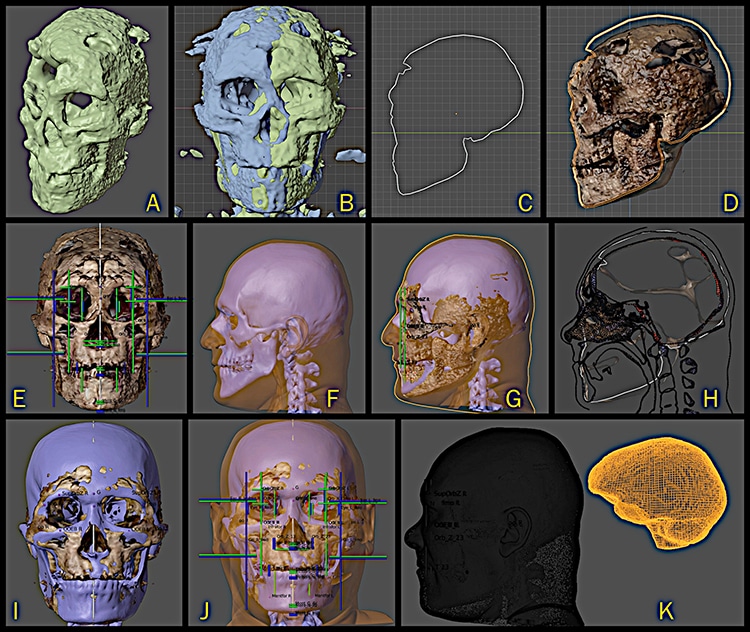View the Reconstructed Face of a 30,000-Year-Old Egyptian Man

A reconstruction of the Nazlet Khater 2 skull gives insight into a character from the past. (Photo: Moacir Elias Santos and Cícero Moraes, CC BY 4.0)
What did a young man look like 35,000 years ago? Modern DNA and computer modeling technology can give us a good, although imperfect, idea. Two Brazil-based researchers—archaeologist Moacir Elias Santos and 3D designer Cícero Moraes—recently published stunning facial reconstructions of a man who roamed Egypt hunting and gathering long before the pyramids and pharaohs. Starting with an ancient skull, the Paleolithic face they created is based on science with artistic decision-making. It allows viewers to feel close to this historic human.
The team started from a skeleton discovered in 1980 at Nazlet Khater 2, an archeological site in ancient Egypt. The skeleton was largely complete except for some feet and hand portions. The ancient Homo sapien would have stood 5'3″ inches tall, and he was likely aged between 17 and 29 years. He is of African ancestry and would have hunted and gathered in a nomadic lifestyle. The skeleton is currently at the Egyptian Museum in Cairo, and it has since been discovered that it is about 35,000 to 30,000 years old. This is within the Upper Paleolithic, around the time the earliest modern human settlements and figurative art appeared.
The skeleton predates the first pharaoh by over 25,000 years. To recreate his face, the researchers began with photographs of his skull. “The skull, in general terms, has a modern structure, but part of it has archaic elements, such as the jaw, which is much more robust than that of modern men,” Moraes told Live Science. “When I observed the skull for the first time, I was impressed with that structure and at the same time curious to know how it would look after approaching the face.”
Using a technique called photogrammetry, the team first digitally reconstructed the skull, which was missing a piece. They then digitally added flesh. There are some guesswork and judgment calls in this process, as it is impossible to know exactly how the flesh would have laid on the bone.
To balance the scientific and the artistic, they created two images. One is a neutral, greyscale, minimalist approximation. The other adds a beard, twinkling eyes, and color to bring the reconstruction to life. The team wants to humanize ancient Homo sapiens such as the Nazlet Khater 2 man by showing how they might have looked alive. The end result is a face you might think you'd recognize on the street today, at the gym, or at the office.
Researchers reconstructed the face of a 35,000-year-old Egyptian man found at the Nazlet Khater 2 site, creating a face we could see on the street today.
Using photogrammetry, the team built upon the skull digitally to add flesh and hair.

Different angles of facial reconstruction. (Photo: Moacir Elias Santos and Cícero Moraes, CC BY 4.0)
The young man comes to life in these images, making history 35,000 years ago seem like yesterday.

Skull photogrammetry and initial anatomical deformation help to “recall” the skull. (Photo: Moacir Elias Santos and Cícero Moraes, CC BY 4.0)

Completing the facial approximation. (Photo: Moacir Elias Santos and Cícero Moraes, CC BY 4.0)
h/t: [IFL Science]
Related Articles:
Egyptian Archeologists Request the Return of the Rosetta Stone and Other Artifacts
Looted 2,500-Year-Old “Green Sarcophagus” Is Returned to Egypt
Scientists Use DNA To Reconstruct Face of 19th-Century Man Accused of Being a Vampire
Scientific Facial Reconstruction Brings Three Medieval Scots Back to Life
READ: View the Reconstructed Face of a 30,000-Year-Old Egyptian Man


0 Commentaires